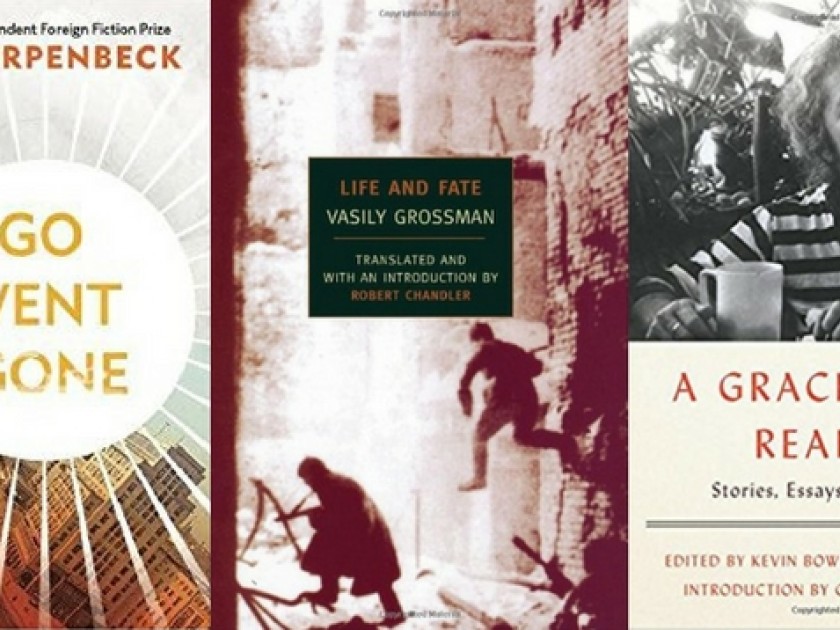Join a community of readers who are committed to Jewish stories
Sign up for JBC’s Nu Reads, a curated selection of Jewish books delivered straight to your door!

Carol Zoref is the author of Barren Island, which was Longlisted for the 2017 National Book Award for Fiction. Earlier this week, she wrote about communal sin and collective responsibility in the wake of the Las Vegas massacre. She is blogging here all week as part of Jewish Book Council’s Visiting Scribe series.
What books of Jewish interest or by Jewish authors are currently on your nightstand?
Nicole Krauss’s Forest Dark, in anticipation of hearing her speak at the 92nd Street Y with Jenny Erpenbeck. As soon as I finish the Krauss novel, I will dive into Erpenbeck’s Go, Went, Gone, which was recently translated from German by Susan Bernofsky — they are a trifecta of smart writers/translators. In nonfiction, Enraged: Why Violent Times Need Ancient Greek Myths by Emily Katz Anhalt. Anhalt, a classics scholar, shines light on how the Greeks struggled with human violence and the desire for moral evolution.
What’s the last great book you read?
Impossible question, but the work I keep recommending is by the twentieth-century Soviet author Vasily Grossman. His novel Life and Fate is a masterpiece. All of his other books — fiction and reportage — are outstanding.
What’s the best classic Jewish novel you recently read for the first time?
Pioneers: The First Breach by S. An-sky, translated from Yiddish by Rose Waldman. I was seated next to Rose at the Jewish Book Council Network Conference last spring, where she showed me the beautiful new edition of this ninety year-old novel about the reach of Haskalah, a Jewish enlightenment movement, into small-town life.
What’s your favorite book no one else has heard of?
There’s nothing that no one has heard of. Rather, there are authors whose work doesn’t receive the attention that it should or that it used to. Grace Paley is the perfect example. She was widely admired while she was alive, both as an author and a political activist. She is shockingly unknown by younger readers and writers a mere ten years after her passing. Those of us who teach can help to set this right by keeping her magnificent short stories front and center. Farrar, Straus and Giroux recently released The Grace Paley Reader last spring. Buy it. Then go out and buy the individual collections of short stories.
Which Jewish writers — novelists, playwrights, critics, journalists, poets — working today do you admire most?
In addition to those I’ve already mentioned, I’m always ready for fiction and nonfiction by Cynthia Ozick. I’m sad that I won’t be reading anything new by Philip Roth, unless he breaks his promise and comes out of authorial retirement. I was bowled over by Paula Vogel’s play, Indecent, when it appeared last year off-Broadway. I was cheered that it received such a warm welcome when moved to Broadway. It’s heartening to know that there is still a place uptown for serious drama. The recent re-staging of Stephen Sondheim’s Pacific Overtures by the Classic Stage Company demonstrated, yet again, the insights about colonialism revealed by this beautiful musical. David Remnick is keeping The New Yorker on fire, both as editor-in-chief and as a writer.
How do you like to read? Paper or electronic? One book at a time or simultaneously? Morning or night?
I read any time that I can, however much or little, day or night — simultaneously a novel, a book of poems, a collection of short stories, and something nonfiction. I’m happier with an actual book in my hands, but I’d rather read electronically than not at all. When I travel, I no longer get anxious about what to bring along or worry that I will run out. If I fall in love with a book that I’ve read electronically, I buy a hard copy.
How do you organize your books?
I don’t. That said, ask me for a book that I own and I’ll pull it off a shelf pretty quickly.
What’s the best book you’ve ever received as a gift?
The Adventures of Huckleberry Finn. Twain was not a Jewish author nor is there a single Jewish character in “Huck.” But it’s a novel that I return to again and again: a story of immoral and moral behavior in immoral times, of the development and collapse of conscience, of hope and hopelessness, and so much more. It was a gift when someone told me to read it again as an adult. It is loathed by people on the Right, it is loathed by people on the Left, and it is adored by me. I could go on — and I’ve been known to — but I’ll let it go at that.
What kind of reader were you as a child?
Insatiable.
Disappointing, overrated, just not good: What book did you feel you were supposed to like, and didn’t?
I’d rather recommend a book than dis one. However, the last novel that outraged me was Bernhard Schlink’s The Reader. The plot premise — that illiteracy resulted in a woman becoming a concentration camp guard — was infuriating. I read the whole thing in the hope that the novel, not the character, could redeem itself. There is no guarantee that literacy shapes ethical behavior, nor that education guarantees insight.
What do you plan to read next?
David Grossman’s A Horse Walks into a Bar, Der Nister’s story collection Regrowth, and Joan Silber’s forthcoming novel Improvement.
Carol Zoref is a fiction writer and essayist. Her novel Barren Island received the A.W.P. Award for the Novel (Association of Writer and Writing Programs). Her writing has also appeared in The New York Times The Christian Science Monitor and more. She is on the faculty of Sarah Lawrence College and also teaches undergraduate fiction writing at New York University.